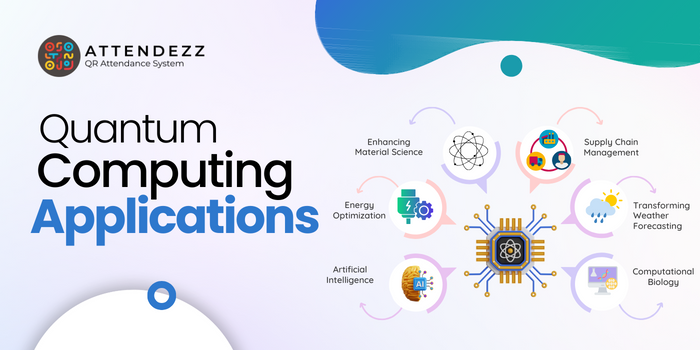Quantum Computing: Introduction
In the era of digital innovation, Quantum Computing is emerging as an important frontier, offering a unique source of endless computational power and revolutionary improvements. This piece of writing explores Quantum Computing, an area that is complex and has a lot of potential for transforming different fields.
The Quantum Leap: Understanding Quantum Computing
Quantum Computing is based on quantum principles and therefore, there is a paradigm shift from classical computing as it utilizes the principles of quantum mechanics to carry out calculations. Instead of the classical bits that can be either 0 or 1, the qubits which can have several states at a time, amplify the power of the processor.
Exploring Quantum Supremacy
The supremacy of quantum is the moment when a quantum computer achieves a performance level superior to that of conventional computers in certain tasks. It is a breakthrough that demonstrates the formidable quantitative capabilities of quantum systems providing a way to the novel progress in cryptography, optimization, and simulation.
Unraveling Quantum Entanglement
The core of the Quantum Computer is occupied by the phenomenon of entanglement which is a state of correlation between qubits. The superpositionality of qubits is an intrinsic feature that underlies the ability to perform complex computations at the quantum level and tackle data processing and encryption problems that were previously out of reach.
Harnessing Quantum Algorithms
Unlike classical algorithms, quantum algorithms, which are designed for quantum systems, take advantage of the peculiar characteristics of qubits to address computational issues more effectively than they would be done through the use of classical algorithms. Sharing algorithms such as Shor’s for integer factorization and Grover’s for unstructured search, are breakthroughs of a kind that can cause exponential speedup in many other applications.
Quantum Computing in Practice
The practical implementation of Quantum Computation however is the most problematic. Victory in the battle against such obstacles as decoherence and error correction will be a crucial step in quantum computers achieving their full potential. Nevertheless, the fast progressions in chip technology, software, and algorithms are driving Quantum Computing towards practical applications.
Quantum Computing Applications

Revolutionizing Financial Modeling
Quantum computing has the power to revolutionize the financial modeling and analysis domain by providing the requisite efficiency in dealing with tremendous data and complex algorithms. A Quantum algorithm can refine portfolio management, risk assessment, and option pricing, in result creating a possibility for previously unattainable optimization by financial institutions.
Advancing Material Science and Engineering
Within the field of material science and engineering, Quantum Computing can now do the impossible – simulate and analyze materials at an atomic and molecular level with extreme accuracy. With this feature, scientists can now develop and discover new materials with specific characteristics that not only hasten the process of renewable energy but also spin off other fields like electronics, and aerospace engineering.
Enhancing Supply Chain Management
The resource of Quantum Computing has the potential to make supply chain management successful and more efficient by solving complex logistic problems, minimizing costs, and maximizing the speed of transactions. The algorithms of quantum computers will be the best for optimizing the stocks, routing paths, and demand forecasting which will enable the businesses to be more streamlined, and adaptable to changing market conditions.
Transforming Weather Forecasting
Meteorology and climate science recognize the potential applications of Quantum Computing for the modeling and simulation of complex weather patterns and climate events with unmatched precision. Quantum algorithms can process big data from satellites, weather stations, and climate models more efficiently than classical computers can, and that results in more accurate weather forecasts, better disaster preparations, and climate change mitigation strategies.
Revolutionizing Energy Optimization
Quantum Computing can make a significant contribution in helping to optimize energy production, distribution, and consumption across many industries. Similarly, quantum algorithms may optimize grid management, energy storage systems, and the integration of renewable energy, thereby contributing to sustainability efforts and reducing carbon emissions worldwide
Empowering Artificial Intelligence
Quantum Computing as the backbone of AI technology will complement AI in machine learning and artificial intelligence-driven developments. Those machine learning algorithms in the world of quantum computing can analyze large data sets and disclose hidden insights and patterns, which traditional AI methods might miss. Thus this partnership which is the cornerstone of the growth in natural language processing, image recognition, and autonomous systems, capacitates the discovery of novel applications in various domains.
Innovating Computational Biology
Quantum computing enables innovative modeling of biological systems and analysis of genomic data for computational biology and bioinformatics. It facilitates the design of novel drugs and therapies. Quantum algorithms allow the simulation of molecular interactions and prediction of protein structures, potentially improving the drug discovery process. These advancements can lead to breakthroughs in personalized medicine, disease treatment, and genetic engineering.
Reinventing Transportation Systems
Today’s transportation systems are going to be transformed by the advent of Quantum Computing, which will allow to improve traffic patterns, route planning, and vehicle design. Quantum algorithms can model routes in traffic systems, optimize public transport networks, and design energy-efficient vehicles; therefore, traffic will be less congested, and carbon emissions in urban environments will be decreased.
Pioneering Quantum Communications
Quantum computing as a key driver of quantum communications, making quantum secure and beyond scraping networks utilizing quantum encryption. The quantum cryptography protocols that use the quantum phenomenon principles to guarantee the privacy of confidential data and its integrity reshape cybersecurity on the data level in the digital era.
Expanding Space Exploration Capabilities
Space exploration and astrophysics may now be enhanced with data analysis made possible by quantum computing, spacecraft navigation, and space mission planning. With quantum algorithms, huge space data can be processed, simulated and optimized to benefit missions ranging from space exploration, and astronomical discoveries to the mystery-solving of the universe.
Conclusion
Quantum Computing is constantly at the leading edge of technological development, a breakthrough that would completely transform the sectors of industry and also redefine the entire computational possibilities. And so our path of discovery unfolds, the promises of quantum computing to transform the digital realm seem endless. Explore AttendEzz our QR code Attendance System. Unlock a better online experience with our web toolkit.
FAQs
With the Quantum Computing principle, quantum mechanics is used to perform mathematical operations, and the powers of characteristics are many times higher than classical computers.
Quantum supremacy refers to the moment at which a quantum computer takes over classical computers in specific tasks, presenting an example of the overwhelming computational power of quantum systems.
On a quantum level, Quantum Entanglement can control qubits, so such computations can be performed and algorithms executed.
Quantum Computing is multifaceted in terms of its applications, including cybersecurity, drug discovery, and machine learning, being a revolutionary milestone for industries with its transforming capabilities.
The advent of Quantum Computing presents the cybersecurity community with challenges as well as opportunities, which has compelled the design and adoption of post-quantum cryptography algorithms to protect valuable data against quantum threats.
Quantum Computing increases drug discovery speed by molecular simulation and optimization, which results in faster screening of molecules and their interactions.


